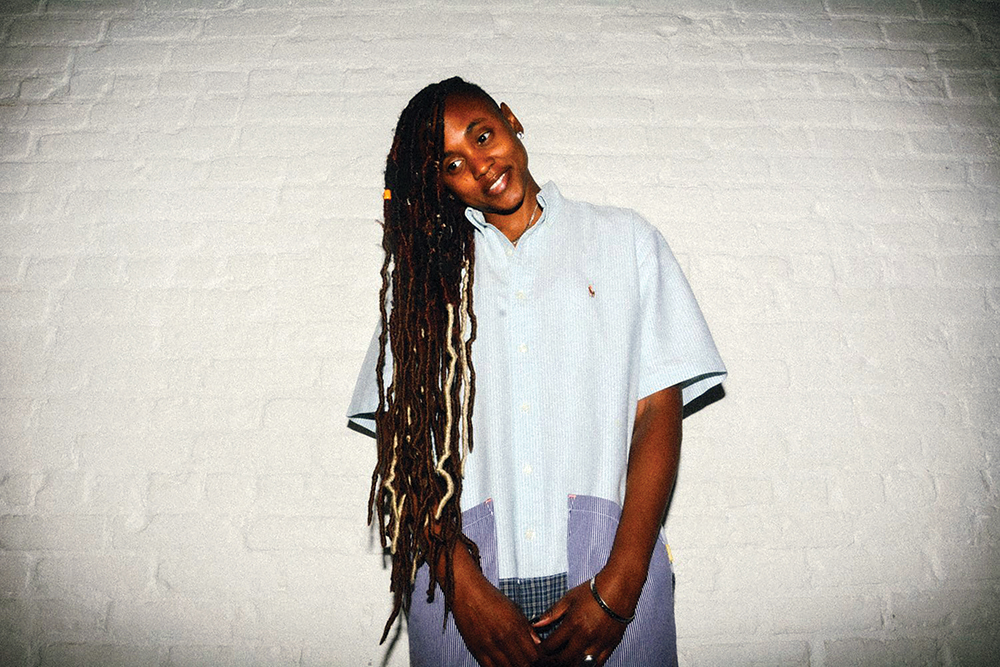It’s not every day that an in-house producer and engineer at Atlantic Records in New York asks to be transferred to Memphis, but Ebonie Smith is not like most engineers. She grew up here and still identifies with her hometown on a deep level. Of course, three years ago, it also made a lot of sense to get out of New York. “I was in New York eight years,” Smith says, “but then the pandemic happened. I told Atlantic I wanted to move down to Memphis for a minute, and they approved it.”
She stayed busy while back in her hometown. “I spent the bulk of my time at 4U Recording, pretty much every other day, and I did a couple dates at Young Avenue Sound and Royal,” she recalls. Besides, being in Memphis not only reminded her of the diversity behind the music she loved most; it represented her spirituality. “The most important thing for me has been my faith and growing up in church,” she says. “My church was First Baptist Beale Street at the corner of Beale and Fourth. There was a natural blending of secular and sacred there. At 2 p.m. on Sundays, Beale Street would start revving up and you could hear the sounds of bands outside bleeding into what we were doing in church. And the sounds weren’t that different. That’s the nature of the Memphis music scene: musicians who’ve been trained in sacred spaces, making their money in both secular and sacred spaces. So there’s always been an interesting dichotomy there.”
Having thus attended the same church as the great hip-hop producer DJ Squeeky, then graduating from East High School, Smith went on to become one of the most high-achieving Memphians in the music industry. Between starting for Atlantic in 2013 and the pandemic era she was involved in many notable projects, such as the original Broadway cast recording of Hamilton, Sturgill Simpson’s A Sailor’s Guide to Earth, the Grammy-nominated album Dirty Computer by Janelle Monáe, and the Grammy-winning album Invasion of Privacy by Cardi B. And yet, having returned to Memphis for a time, she felt she could take things further. And that meant going west.
After the world stopped sheltering in place, she headed to Los Angeles, where she’s chosen to settle down for a time. “They have more studios here,” she notes. “In New York we only really have one room, with a few auxiliary spots, but in LA there’s a lot more going on and a lot more studio facilities. It’s been nice because it’s been a lot more nomadic than New York. I bounce around. Each studio has a different personality. Different equipment, different clientele. So that’s been cool. The studio in New York is really nice, but I’ve been learning a lot more about gear out here.”
The move has also led her to further develop her career as an independent producer. “Atlantic has been such a big part of my career, and they’re one of the reasons why I’ve had so many great credits,” she points out, but then adds, “I’m mostly working freelance these days. I’m still with the company, but I think, post-Covid, fewer artists are bringing their whole projects in. The days of getting the whole Hamilton cast album are gone. Which is one of the reasons I moved to LA. There’s more happening out here than there is in New York. I’m focused on making records, things that are going to go out into the world. So I’ve been hustling out here.”
Meanwhile, she’s also been focused on her nonprofit, Gender Amplified (genderamplified.org), which she started while still a senior in college in 2007. “Gender Amplified is my passion work,” she says. “Our mission statement is to advance the careers of women in music production and audio engineering, and we’ve recently expanded our definitions to include nonbinary producers and trans producers. Warner Music Group gave us a pretty sizable grant a couple years ago, so we’ve been hiring staff and doing our music production camps in New York. We also did an event in Memphis with 4U Recording, for Women’s Equality Day in August of ’21, and that was a fabulous experience; we want to do more with them. It’s just a matter of setting it into motion.”
